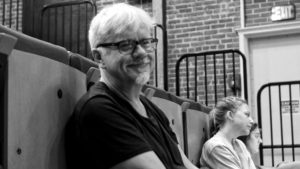
“I think it is essential right now to remind people of their humanity, but their shared humanity. And that shared humanity has to cut across political beliefs if we are going to survive.” Perhaps no sentence sums up more succinctly what actor/writer/director Tim Robbins want to make clear with The Actors’ Gang production of We Live On which was adapted from Studs Terkel’s 1970 book Hard Times.
As in the book on which it is based, We Live On is an oral history of people who made it through the Great Depression. As adapted and performed by The Actors’ Gang company, selected stories from Hard Times are presented from the third person perspective. This is not a truly documentary approach where each actor depicts the story they are telling and in some cases they are telling stories from their own families.
It is a monumental work in three parts – each of which lasts approximately 80 minutes – that is being presented online. The first part premieres on Thursday, July 29th with the subsequent two parts premiering on Friday, July 30th and Saturday, July 31st.
What follows are excerpts from a phone conversation I had with Robbins last week that have been edited for length and clarity.
In Hard Times Studs Terkel said, “It’s very important we learn people as people are.” Is there one fundamental truth you’ve learned about people through the creation of We Live On?
Yes, I guess the thing that struck me the most about this story is the importance of the resilience, the courage and the tenacity it takes to survive through a catastrophe, a social upheaval. What Stud Terkel’s stories provided was a verité, a truth, a lived experience. These are real people. It’s not famous people. It’s people who struggled through this thing and made it.
Does a work like this remind us what happens when we don’t have personal connections? When we are kept in isolation from one another? Is that what makes it topical as we inch our way out of the pandemic?
That’s at the core of it. It’s all about that. That is something we’ve been working on for years at the Gang – how do we do work that matters to the audiences we’re speaking to. You add into that with what’s been happening over the past 10-15 years with people becoming more and more obsessed with their phones and more and more distracted from actual human contact.
After our first workshop performance, we did a talkback. I’m looking at the amount of people who have come to join us. My first fear was people are so burned out by Zoom, how are they going to hang in for 1 hour and 20 minutes. The number didn’t reduce. Everybody stayed and they stayed for another one-and-a-half hours and didn’t drop off. People stuck in for the whole thing. That made me realize that human connection is essential and has been missing and missing from theater and missing from films.
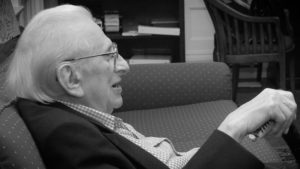
Terkel once said, “I’ve always felt, in all my books, that there’s a deep decency in the American people and a native intelligence – providing they have the facts, providing they have the information.” Even with information, this is a deeply divided country. Is his view no longer an accurate depiction of the American people?
I believe it is accurate still. I don’t know that we have all the facts and all the information. I don’t know that we have a well-informed and educated populace in this country. Particularly in terms of the arts. Certainly the marketplace doesn’t help with that at all. We’ve seen the movie industry lose all interest in creating dramas that matter like they used to in the 70s and 80s. The idea that we are storytellers and we have a kind of responsibility to tell varied stories.
I think when you tell a human story that might illuminate some truth that’s humanity. That’s what we’re in for. If you go back to the roots of it all and look how theater began…it was all centered around the big questions about man, hubris, gods and morality and what happens when you make decisions in your own life that go against the lessons that we’ve learned and what is the cost of that. The big questions.
And the more we remove from thinking the more we remove ourselves from feeling.
It’s why I wanted to do this material. We can’t be marginalizing people and telling them to shut up or that they are not worth anything because they disagree with us. This is what social media has accelerated. This idea that if you don’t agree with me I’ll cancel your ass. This is not a healthy environment to be in. Even if you disagree with someone they are still a person. Families are being divided. This is not the future we want.
When we are looking at a piece we want to do we have to understand we can’t do a litmus test on our audiences. We don’t ask people when they buy tickets to come see a show what their political beliefs are, what their health beliefs are, what they feel about this or that. We want people to share something on a communal space where they can all be reminded that despite their differences there is something that they share and it’s the human heart. That’s what Studs was talking about. That inherent goodness as people.
Haven’t we gotten very far from that ideal?
When you see division happening in a culture you can safely assume that there are those in power that would like to see you divided. As long as you are divided they can stay in power. It’s been that way from time immemorial. You go into an area and figure out how to create factionalism, they are not going to unite to kick you out. It’s the same in the United States on both sides.
So the recent revelation that a 1972 study from MIT predicted the fall of society in 2040 doesn’t surprise you?
It might happen sooner.
Not if the performing arts has anything to say about it.
That’s the whole point of what we do. I do not believe in any kind of exclusion at this point. You cannot have a cultural division going into the door. You just can’t. Let’s hope we get to a saner place with all of us. What we really need when we gather in a group, in an audience, in a concert venue, we need to have trust. And we need to have trust both ways that we all care about each other enough that we will take care of each other.
Photos of Tim Robbins courtesy The Actors’ Gang Facebook page


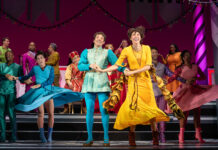
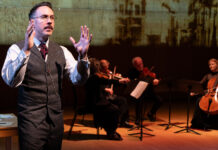
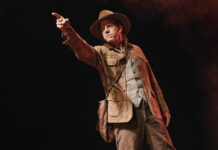
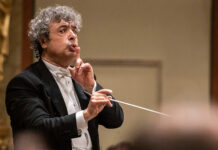




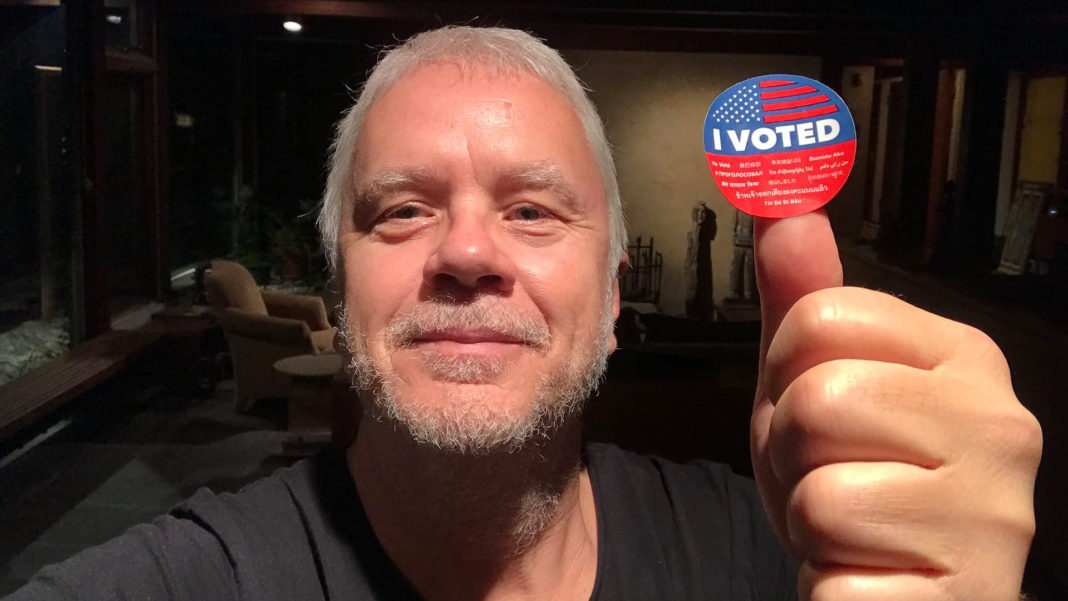
I agree with Tim Robbins. What a beautiful article. Thank you from the bottom of my heart.
Thank you,Cynthia! We’re so glad you liked it!